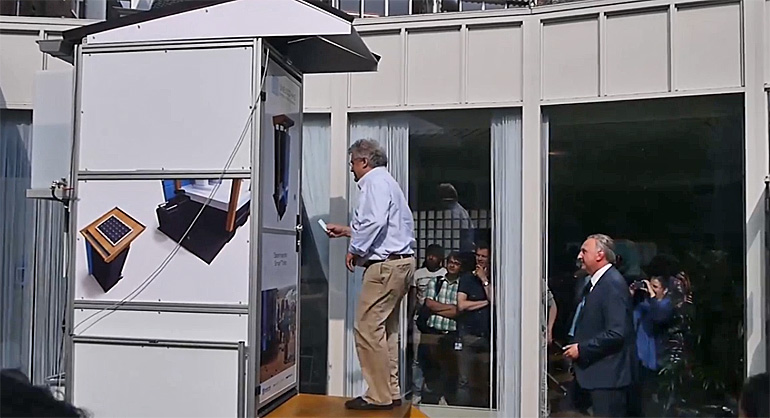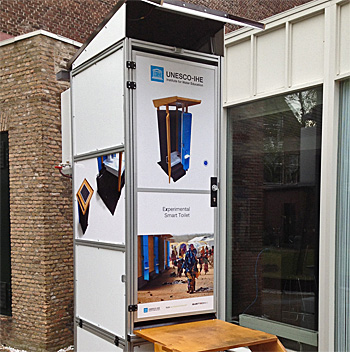Smart emergency eSOS toilet launched by Unesco-IHE institute, Delft, the Netherlands
 The smart designed eSOS toilet for emergency situations was launched by Unesco-IHE Institute for Water Education in Delft, the Netherlands on 11 July.
The smart designed eSOS toilet for emergency situations was launched by Unesco-IHE Institute for Water Education in Delft, the Netherlands on 11 July.
The launch took place in the garden of the water education institute and its first official user was Unesco-IHE's rector Andras Szollosi-Nagy (top photo).
The first experimental prototype of the smart toilet was developed by Unesco-IHE in collaboration with Dutch-based innovation agency Flex /The Innovation LAB and technical design firm Systech.
The development is funded by the Bill and Melinda Gates Foundation-funded project SaniUP - Stimulating local innovation on sanitation for the urban poor in Sub-Saharan Africa and South East Asia.
 First prototype of the light-weight eSOS toilet with several smart ICT features, including a remote-sensing monitoring of the accumulation of feces.
First prototype of the light-weight eSOS toilet with several smart ICT features, including a remote-sensing monitoring of the accumulation of feces.
Cost saving smart ICT
The emergency Sanitation Operation System (eSOS) concept provides a sustainable, holistic and affordable sanitation solution during the aftermath of a disaster.
The eSOS reinvents (emergency) toilet and treatment facilities, and uses ICT to bring cost savings to the entire sanitation management chain.
The toilet is easily deployable in disaster areas because of their robust and light-weight specifications. The prototype includes some unique features that will shed new light on how the toilets are used in emergencies, such as a remote-sensing monitoring, an energy supply unit, GSM/GPS sensor/card, occupancy sensors, urine/faeces accumulation sensor, and S.O.S. button.
A communication system allows for data collection by remote sensing and their transfer to an on or off-site emergency coordination center.
The data resulting from the use of the toilets will allow the toilets as well as the entire sanitation management chain to be improved.
Field testing
The eSOS toilet will be tested further in a refugee camp in the Philippines in September with support of the Bill and Melinda Gates Foundation and the Asian Development Bank.
Unesco-IHE PhD fellow Fiona Zakaria from Indonesia will carry out further experimental testing in cooperation with relief agencies on the ground.
The working prototype and a 1:10 futuristic scale model will be on display at Unesco-IHE until end of August.
This news item was originally published on the website of Unesco-IHE.
More information
Unesco-IHE
Delft, the Netherlands
+31 15 212 29 21
www.unesco-ihe.org
Launch of the smart eSOS toilet for emergencies in the UNESCO-IHE garden on Friday, 11 July 2014.



